MOUNT MAUNGANUI, New Zealand: New test captain Mohammad Rizwan made 71 and Faheem Ashraf 91 to help Pakistan weather a top-order collapse, then fight back on a day punctuated by lashing rain and hail to reach 239 before their last wicket fell in the last over Monday on the third day of the first cricket test against New Zealand.
Rizwan came to the crease when Pakistan was 52-5 during a morning session in which it lost four wickets for 32 runs. He left when it was 186-7 in the final session, having done as much as a captain can to rescue his team from imminent peril.
With Faheem, who made his highest test score and was the last man out, Rizwan put backbone into the Pakistan innings as it replied to New Zealand’s first innings of 431. Faheem outlasted Rizwan and played some elegant shots, some streaky to accumulate 15 fours and a six and ensure Pakistan avoided a follow on New Zealand likely would not have enforced late in the day.
He carried Pakistan past the follow-on mark of 231 with a four from the bowling of Neil Wagner 15 minutes before stumps which also took him past his previous highest test score of 83.
The seventh wicket partnership of 106 between Rizwan and Faheem lasted 30 overs and begun to look almost unbreakable until a direct hit by Mitchell Santner from mid-wicket ran out Rizwan late in the day. It was unfortunate end for the Pakistan captain who proved his value as he stood in for the injured Babar Azam and who batted for three and a half hours and compiled his fourth half century.
Rizwan and Faheem first had to establish themselves on a pitch which proved too difficult for most of Pakistan’s best batsmen, then keep their composure as three heavy rain showers and an abrupt hail storm interupted their progress.
New Zealand had consolidated its strong position in the match during the first session in which it captured the wickets of Abid Ali (25), Mohammad Abbas (5), Azhar Ali (5) and Haris Sohail (3).
Pakistan resumed at 30-1 and Abid and Abbas defied the bowling for 12 overs before the first wicket of the day fell to Kyle Jamieson. Abbas took 37 balls to get off the mark but performed his role as the resilient nightwatchman.
Abid was the first man out Monday, bowled by Jamieson who first forced him back with a ball which reared just short of a length then beat him with a fuller ball as he hovered on his crease.
Trent Boult ended Abbas’s 79 vigil, bowling around and producing a ball which took the edge and gave Ross Taylor his 150th test catch at slip.
Tim Southee then claimed the wickets of Azhar and Sohail in the same over. Azhar’s nick to wicketkeeper B.J. Watling was too faint for the on-field umpire but couldn’t deceive the television replay and Sohail skewed a drive to Henry Nicholls in the gully.
With Rizwan’s steady example, Pakistan lost only one wicket in the second session which was shortened by a rain break and hailstorm which drove the players from the field just before tea.
Fawad Alam and Rizwan were tested by a barrage of short-pitched balls from Neil Wagner and Fawad succumbed when he hooked and was caught by Watling. Wagner took his full turn at the bowling crese Monday despite suffering a broken toe when batting on the second day.
Faheem came to the last over of the day needing 13 runs for a first test century. He hit out, striking the first ball for four but edged the next to wicketkeeper Watling, leaving the ground to unanimous applause from his teammates.
Pakistan out for 239, avoids follow on in 1st test vs NZ
https://arab.news/58tv8
Pakistan out for 239, avoids follow on in 1st test vs NZ
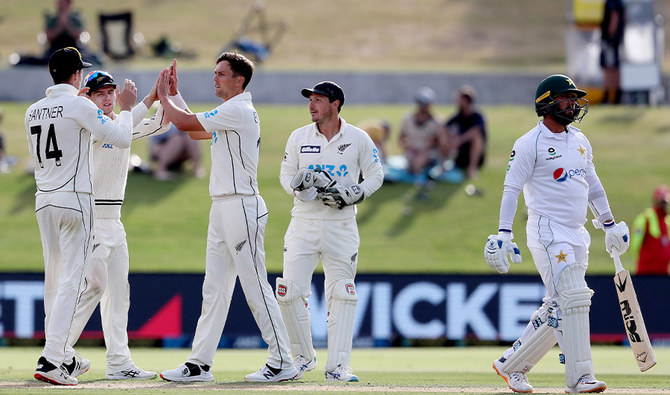
- Pakistan past the follow-on mark of 231 with a four from the bowling of Neil Wagner 15 minutes before stumps
- The seventh wicket partnership of 106 between Rizwan and Faheem lasted 30 overs
Gunmen kill a police officer assigned to protect polio workers in northwest Pakistan
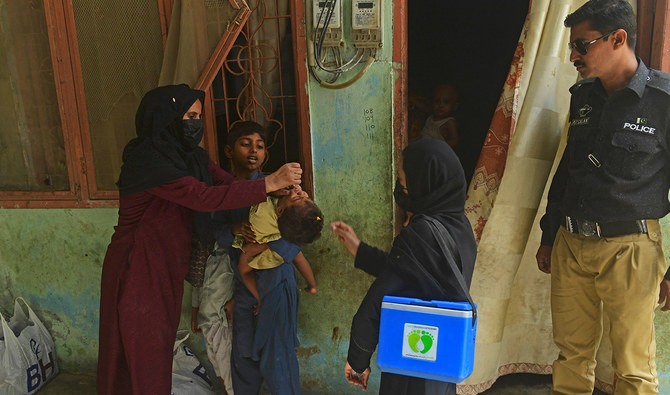
- At least 10 police have died this year while on security duty for vaccination campaigns in Khyber Pakhtunkhwa province
- Anti-polio campaigns in Pakistan are regularly marred by violence, with militants claiming campaigns sterilize children
PESHAWAR: Gunmen fatally shot a police officer assigned to protect polio workers in Pakistan’s northwest, an official said Tuesday.
At least 10 police have died this year while on security duty for vaccination campaigns in Khyber Pakhtunkhwa province.
The gunmen fired at a team working in Bajaur district, killing the officer on the spot, police officer Dilawar Khan said.
No one immediately claimed responsibility for the assault.
Anti-polio campaigns in Pakistan are regularly marred by violence. Militants target vaccination teams and police assigned to protect them, falsely claiming that the campaigns are a Western conspiracy to sterilize children.
A five-day anti-polio campaign started Monday in 13 high-risk districts of Khyber Pakhtunkhwa. More than 21,000 teams are tasked with administering vaccines to 4,423,000 children under age 5. More than 32,000 police are protecting the teams.
Pakistan and neighboring Afghanistan are the only countries where the spread of polio has never been stopped.
The potentially fatal, paralyzing disease mostly strikes children under age 5 and typically spreads through contaminated water.
Occupiers using ‘fake news’ against freedom struggles in Kashmir, Palestine — Pakistan’s UN envoy
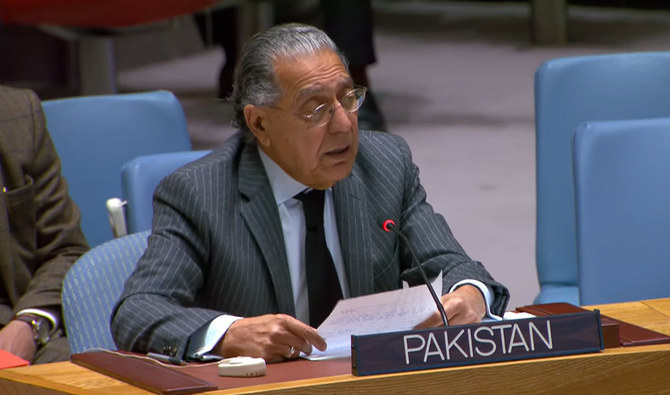
- Conflicts in Gaza and Ukraine have become key battlegrounds in an information war
- Online propaganda fighting to make people around the world take sides, harden positions
ISLAMABAD: Pakistan’s Permanent Representative to the United Nations, Ambassador Munir Akram, has said occupying powers were increasingly using fake news and disinformation campaigns to subdue freedom struggles in Kashmir and Palestine, state-run APP said on Tuesday.
The conflicts in Gaza and Ukraine have become key battlegrounds in an information war that goes far wider than their tightly drawn physical borders. Carefully crafted social media posts and other online propaganda are fighting to make people around the world take sides, harden their positions and even move broader public opinion.
While plenty of real imagery and accounts of the ensuing carnage have emerged, they have been intermingled with users pushing false claims and misrepresenting videos from other events.
“We are witnessing this today in the Gaza war and have witnessed this consistently in the case of occupied Jammu and Kashmir,” Akram told the UN Committee on Information on Monday, referring to online disinformation campaigns.
Akram voiced regret that the use of digital media was “turbocharging” the spread of disinformation “to promote Islamophobia to justify foreign occupation and aggression to turn victims of aggression into the culprits.”
This had led Pakistan to initiate a resolution on disinformation which was unanimously adopted last year, the Pakistani envoy said, adding that consultations would soon take place to advance its objectives.
“Pakistan would welcome the development of an inter-governmentally formulated code of conduct for information integrity on digital platforms,” Akram said, adding that the increasing use of AI tools to spread false information and conduct digital surveillance needed to be addressed.
“At the core of information manipulation, Internet blackouts, censorship and the use of special media laws by the occupation authorities is a sinister design to de-legitimize freedom struggles and perpetuate a climate of fear, intimidation and violence,” Akram added.
In some instances with regards to the Gaza war, online propaganda simply involves the framing of real events, violent images and videos, and hate speech to emphasize the guilt of one side and vindicate the other.
But much of the material relies on the creation of what’s commonly referred to as fake news, in the form of fabricated stories published on social media that repurpose or mislabel real photos or videos.
For example, one post on X (formerly Twitter) that was viewed 300,000 times used a photo of an accidental fire at a McDonald’s restaurant in New Zealand to falsely claim the company had been attacked by pro-Palestinian protesters for its perceived support of Israel. Despite being debunked, the story was still the focus of heated discussions on social media channels.
There are also reports of excerpts from video games and old TikToks being shared with claims they are from real current events in Gaza, and fake government agency social media accounts posting disinformation.
Pakistan unveils advanced anti-rape cell in Karachi to boost conviction rate in sexual violence cases
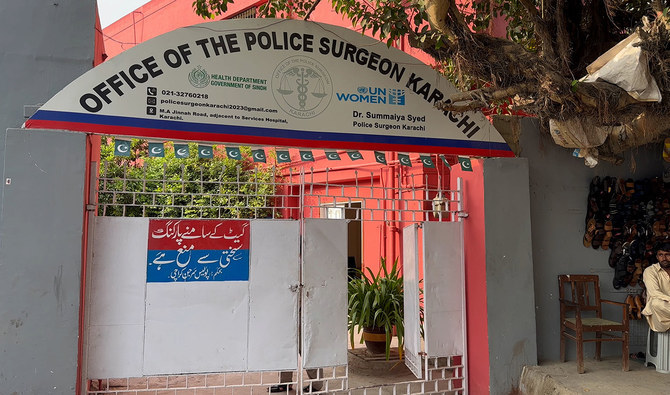
- The model cell is an improved version of a pilot project launched in the southern Pakistani city last year
- A medical legal department at the center of the new cell will work with the police, empower prosecution
KARACHI: Less than eight months after the inauguration of the pioneering Anti-Rape Crisis Cell in Pakistan’s southern Sindh province, authorities on Tuesday unveiled a model cell to address legal cases involving sexual- and gender-based violence.
According to War Against Rape, a non-profit organization, Pakistan witnessed 5,279 reported rape cases in 2021, with less than three percent resulting in convictions, highlighting the urgent need for such initiatives.
Dr. Summaiya Syed, Police Surgeon Karachi, said recent measures in the province, including the Sindh Sexual Violence Response Framework of 2021 and the launch of the pilot Anti-Rape Crisis Cell last year, had shown promising progress, taking the conviction rate in cases of sexual violence from five to 15 percent.
“It offers separate spaces which weren’t really available in the pilot project,” she said after the launch of the model cell at the Jinnah Postgraduate Medical Hospital in a ceremony attended by the provincial health minister, Dr. Azra Pehechu, as the chief guest.
“Now we have better a space, better organization, better referral pathways, better connections between those referral pathways and better availability of resources,” she added.
Dr. Syed said they had learned several things from the pilot project which were utilized while setting up the new establishment.
“We hope that here since now we have dedicated referral pathways, dedicated SOPs [standard operating procedures] will be followed,” she added. “I have better staff provisions over here. We hope to take that [conviction ratio] higher.”
Maliha Zia, Associate Director Legal Aid Society, said facilities like anti-rape cells generate proper and effective evidence in cases of rape which can be used during the prosecution stage.
She said the government of Sindh, along with the police and the judiciary, had been working extensively for the last three years on improving the state’s response to rape cases.
The initiatives taken by the provincial authorities, she added, included training of medical staff to understand the role that they need to play during the trial and the necessary changes they need to make while reporting these cases.
“All this work has culminated in the establishment of an anti-rape crisis cell which not only puts together the medical legal department at the center, a capacitated medical legal department, but connects it directly with the police and prosecution to make an effective case,” Zia continued, adding strong medical evidence and solitary statement of the survivor would result in conviction rates.
Pakistan top court seeks government response on alleged intelligence interference in judiciary
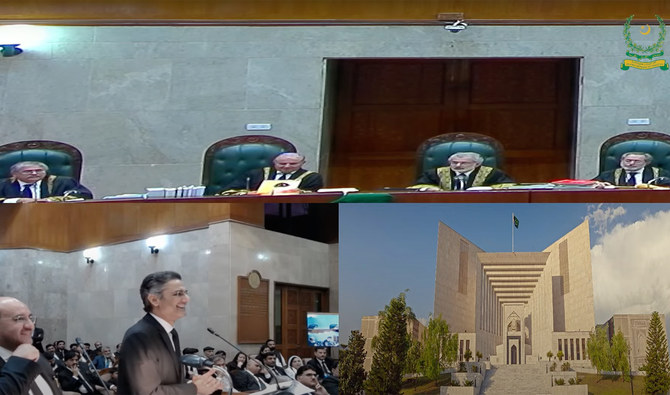
- The Supreme Court took up the case after six high court judges accused Pakistani spy agencies of intimidating them
- Chief Justice Qazi Faez Isa emphasizes he will not accept ‘any interference’ from any source in the judiciary’s affairs
ISLAMABAD: Pakistan’s top court on Tuesday sought replies from the government and bar associations in a case involving accusations levelled by six high court judges of intimidation and interference by the country’s intelligence agencies in judicial matters.
The Supreme Court of Pakistan took up the case after six out of eight Islamabad High Court (IHC) judges accused the Inter-Services Intelligence (ISI) agency of intimidating and coercing them over legal cases, particularly those with significant political consequences.
The judges provided various examples of alleged interference, including a case concerning Pakistan’s jailed former prime minister Imran Khan, and mentioned incidents where they said their relatives were abducted and tortured, and their homes were secretly surveilled, aiming to coerce them into delivering favorable judgments.
During the hearing on Tuesday, Chief Justice Qazi Faez Isa directed Attorney-General Mansoor Usman Awan to submit the federal government’s response in the case, ruling that if any intelligence agency or institution wanted to submit their response, they could do it until May 6.
“We all sitting in the court want to see judiciary independent,” he said. “Anyone in this court who doesn’t want judiciary’s independence [from external pressure], they can come forward.”
The development came after five high courts in the country, including the IHC, submitted their suggestions in the Supreme Court to prevent meddling of intelligence agencies in judicial affairs.
Chief Justice Isa also sought suggestions from the Pakistan Bar Council and the Supreme Court Bar Association before the next hearing.
“I will never accept any interference from any source and there has not been a single complaint since my assumption of this office to me or the SC’s registrar,” he said.
The letter by the IHC judges earlier stirred frantic debate in Pakistani political, media and legal circles that prompted Prime Minister Shehbaz Sharif to set up an inquiry commission late last month to investigate the accusations. But former chief justice Tassaduq Hussain Jillani, who was appointed head of the commission, recused himself, leading to uncertainty about the process.
Chief Justice Isa, who has repeatedly said that judicial meddling would not be tolerated, mentioned in Tuesday’s hearing that such interference could occur in multiple ways.
“Interference can be from within and without, from intelligence agencies, from one’s colleagues and family members or from social media,” he said.
The top judge maintained that judgments and court orders “shout” on their own if there was interference.
During the hearing, Justice Athar Minallah said there had been no interference during his time as a judge of the Islamabad High Court. He said this was a matter of public interest and a case involving the armed forces as they were the “defenders of the country.”
“We also have to maintain the image of our armed forces,” Justice Minallah remarked. “These are our soldiers who defend the country.”
The court ruled that no new petitioners would be made respondents in the case and adjourned the hearing till May 7.
Pakistani actress Mahira Khan bags ‘Artist in Fashion’ award at EMIGALA ceremony in Dubai

- EMIGALA awards in Dubai acknowledge creative and innovative impacts in the beauty and fashion industries
- With a string of successful projects in film and TV, Mahira Khan is considered Pakistan’s most successful actress
ISLAMABAD: Pakistani actress Mahira Khan bagged the “Artist in Fashion” award at the recently held prestigious EMIGALA awards in Dubai, where some of the world’s biggest names in fashion and beauty worldwide were honored.
Khan was in attendance at the award ceremony held at Festival Bay in Dubai on Apr. 27 and 28. The event featured an array of A-list attendees such as Brazilian-American beauty personality Camila Coelho, Lebanese-British fashion entrepreneur Karen Wazen, Dubai Bling star Loujain Adada, social media sensation Narins Beauty, Indian singer Arjit Singh and Khan, among others.
The EMIGALA awards acknowledge the creative and innovative impacts of global celebrities in the realms of beauty and fashion.
“The Artist in Fashion, Mahira Khan,” Emi Gala Awards wrote on Instagram with a picture of Khan posing with her trophy on Monday.
Khan is counted among Pakistan’s most prolific actresses, gaining widespread recognition for her work in her country’s entertainment industry. The Pakistani actress became a household name after a string of successful drama serials following which she forayed into movies and made her mark across the border in India.
She had her Bollywood debut opposite iconic actor Shah Rukh Khan in a crime action film, “Raees,” which was released in 2017. The Pakistani celebrity was also working on other Indian movie projects, though they could not take off when relations between the two countries deteriorated in 2016 after an Indian army brigade headquarters came under attack in Uri. The administration in New Delhi suspected Pakistan’s involvement which was denied by officials in Islamabad.
In 2021 Khan achieved another milestone when she debuted at the Cannes Film Festival, representing L’Oreal Paris Hair in her country. She has also represented various renowned local brands such as Elan, Zohra Rahman, and Menahel and Mehreen.










